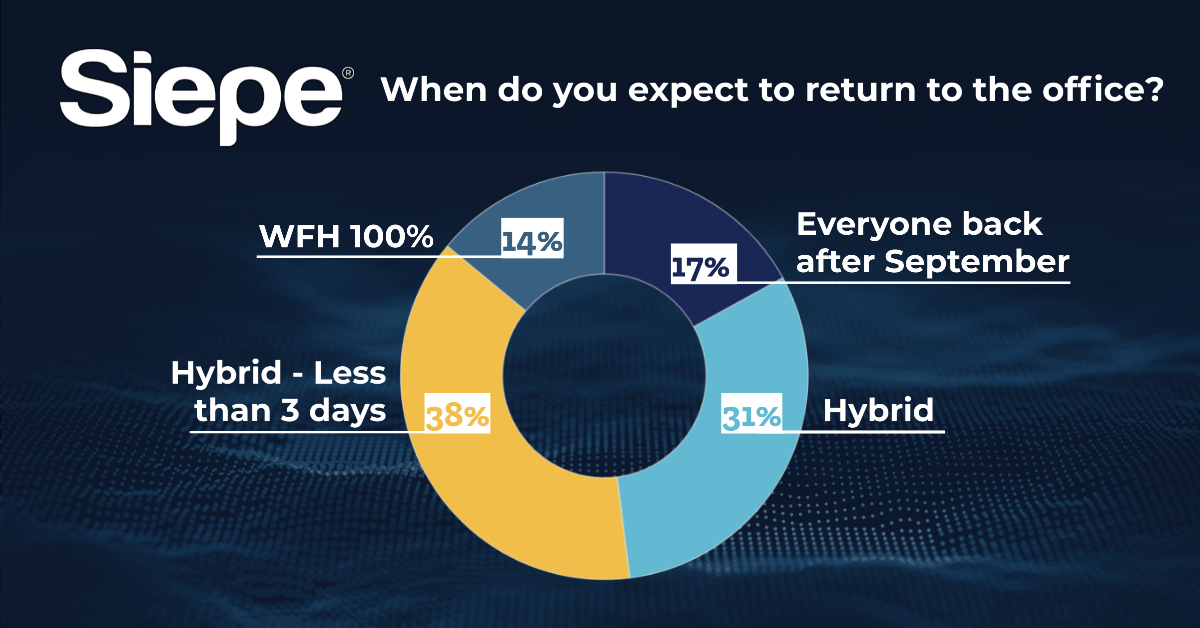As the COVID-19 vaccine rollout continues and restrictions ease around the world, there have been countless debates on whether the working environment will return to the pre-covid normal. Many of the larger asset managers and global banks have announced their intentions, with some opting for most, if not all, their employees to be back in the office by the end of the year; while others plan to adopt a more hybrid workplace.
We recently conducted a survey to see if disruption caused by the global pandemic has led many businesses to rethink their work practices and if people will be returning to the office towards the end of this year.
When do you expect to return to the office?
- Everyone back after September: 17%
- Hybrid – At least 3 days: 31%
- Hybrid – Less than 3 days: 38%
- WFH 100%: 14%
Unsurprisingly, most individuals expect to be working remotely in some way, shape or form by the end of the year, but it was good to see that many were optimistic about being able to get closer to pre-covid normality. This was much in line with the CFA Institute’s latest study which found that at least 81% of respondents want to work remotely at least some of the time. So why is this important?
It may seem trivial, but businesses need to understand their staffing footprint in the future. For example, they need to ask and have the solutions to the following questions: Do we continue to support a hybrid workforce? What tools and solutions are required to seamlessly continue business as normal? What is the incremental cost (or savings) to operate a hybrid working environment? What are its limitations (or advantages)?
For businesses choosing to have employees back in the office, we released a Return to Office Toolkit at the start of this year outlining the measures and precautions businesses can take to ensure employee safety. But why should businesses use a managed services provider to help them return to the office, especially when deciding to embrace a hybrid working environment?
- Access data and workflows remotely and from the office – By moving to cloud IT infrastructure and upgraded on-premise servers, businesses can ensure their employees can continually access the workflows they need, while having the flexibility to scale quickly and efficiently, regardless of location, to meet their requirements.
- Maintain security both at and away from the office – Financial services firms are becoming more disproportionately targeted by hackers compared to other industries, and with businesses becoming increasingly digitized, security needs to be maintained at all endpoints, especially at the end-user. Managed services providers can help implement measures that reduce the risk of cybersecurity breaches, such as:
- Additional password security
- Multi-factor authentication
- Controls that detect and prevent unauthorized access
- Web application firewalls
- Adhere to regulatory and compliance standards – It is becoming increasingly more difficult for businesses to stay on top of ongoing regulatory reforms and ensure compliance both at the firm and individual employee levels. By using a managed services provider, asset managers are ensured that they have the tools to meet certain regulatory obligations, avoiding fines and loss of productivity.
Where do we see the office environment in the next few years? That’s still up in the air but one thing for certain is that cloud computing and IT software offer a solution for staying operational while providing employees and businesses the flexibility to work from anywhere.
Contact us today to see how we can help.

